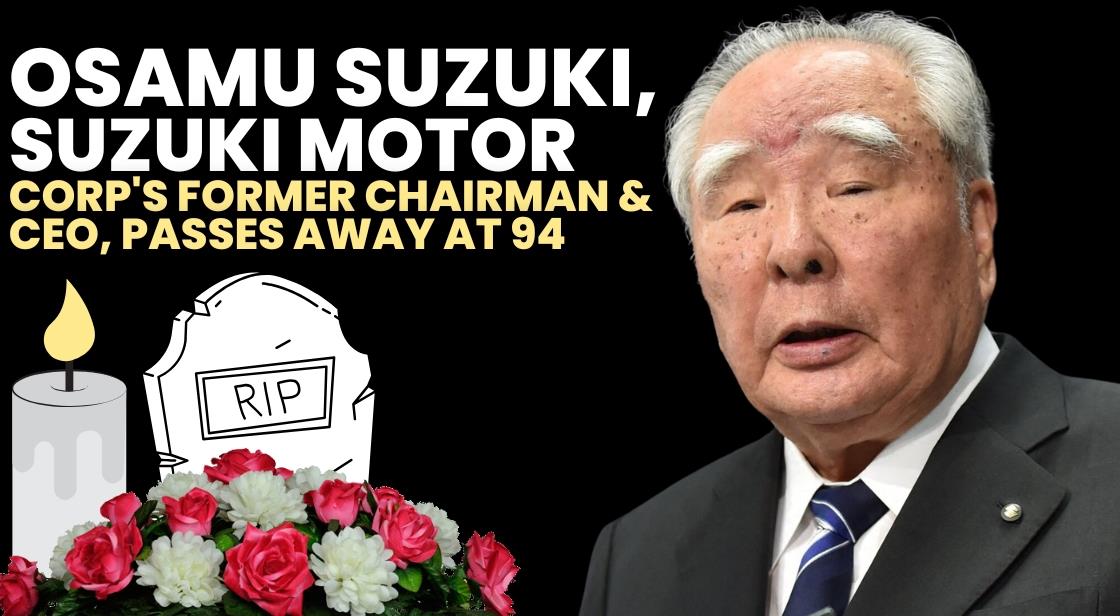Osamu Suzuki, Suzuki Motor Corp's Former Chairman and CEO, Passes Away at 94

News Synopsis
Osamu Suzuki, the former Chairman and CEO of Suzuki Motor Corporation, passed away on Wednesday at the age of 94 in Tokyo, Japan. The company announced his death on Friday afternoon. According to the statement released by Suzuki Motor, the cause of his death was malignant lymphoma. He led the company for more than 40 years, from 1978 to 2021, having served in various leadership roles, including president, chairman, and CEO.
Suzuki’s Leadership Legacy
Under Suzuki's leadership, Suzuki Motor Corporation grew from a modest company with consolidated sales of approximately 300 billion yen (USD 1.9 billion) in 1978, to a global powerhouse with over 3 trillion yen in consolidated sales by fiscal 2006. Suzuki is also credited with shaping the company’s dominance in India’s car market, where the company became a household name, particularly with its compact car offerings.
The Rise of Suzuki Motor
Suzuki was born as Osamu Matsuda on January 30, 1930, in the Gifu Prefecture of central Japan. After graduating from Chuo University in 1953, he began his career as a loan officer in a local bank. He married Shoko Suzuki, the granddaughter of Michio Suzuki, the founder of Suzuki Motor Corporation. Osamu Suzuki adopted the Suzuki family name and began working at the automaker in 1958, eventually becoming an influential leader within the company.
Transforming Suzuki Motor into a Global Powerhouse
Suzuki's vision for Suzuki Motor led to its transformation from a loom manufacturing company founded in 1920 to one of Japan’s leading automakers. Unlike other Japanese automakers that focused on expanding into the United States and China, Suzuki targeted emerging markets in India, Southeast Asia, and Hungary, focusing on producing mini-vehicles and compact cars. This strategy played a pivotal role in Suzuki's growth, especially in India, where the company became the leader in the car market.
Strategic Partnerships and Expansions
Throughout his tenure, Suzuki pursued strategic partnerships to drive the company’s growth. In 2009, Suzuki entered into a business and capital alliance with Volkswagen AG, although the partnership was dissolved in 2015. Suzuki also led the formation of a capital alliance with Toyota Motor Corporation in 2019, with the aim of co-developing self-driving vehicles and tapping into the evolving automotive technologies of the future, including CASE (connected, autonomous, shared, and electric vehicles).
Exit from U.S. and Chinese Markets
Under Suzuki's leadership, the company made key decisions to exit certain markets. In 2012, Suzuki withdrew from the U.S. automobile business, citing the preference for larger vehicles in the market. The company also exited the Chinese market in 2018, as it found the market's demand for larger cars incompatible with its production focus on compact and mini-vehicles. Despite these exits, Suzuki’s dominance in other regions, particularly India, continued to grow.
Stepping Down as President
In 2015, Suzuki stepped down as president of Suzuki Motor Corporation, passing the leadership baton to his son, Toshihiro Suzuki. However, he continued to serve as chairman until 2021, remaining an integral part of the company’s strategic direction and operations.
Conclusion: Osamu Suzuki's Legacy in the Automotive Industry
Osamu Suzuki’s death marks the end of an era for Suzuki Motor Corporation. His visionary leadership helped transform the company into a global automotive giant, with a particular focus on emerging markets such as India and Southeast Asia. Under his direction, Suzuki’s innovations and strategic partnerships helped cement its position as a leader in compact and mini-vehicle manufacturing. Despite stepping down in 2015, Suzuki’s influence continued to shape the company’s future, especially in areas like autonomous and electric vehicle development. His legacy will continue to live on as a pioneering figure in the global automotive industry.
You May Like









